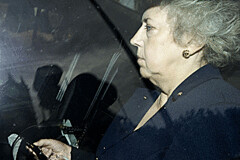
Eliza Manningham Buller, the former British MI-5 intelligence chief, criticized the invasion and occupation of Iraq by the UK and the U.S. in a commission of inquiry. She said that the occupation radicalized a generation of British youth.
Originally uploaded by Pan-African News Wire File Photos
19:02 Mecca time, 16:02 GMT
Iraq war 'triggered UK bomb plots'
Eliza Manningham-Buller said there was no clear link between Baghdad and September 11
Britain's support for the war in Iraq was connected to a series of deadly bombings in London and sparked a rise in domestic attack plots that "swamped" security services, a former intelligence chief has said.
Eliza Manningham-Buller, director of the MI5 between 2002 and 2007, told a public inquiry in London on Tuesday that the 2003 invasion "undoubtedly increased the threat [of domestic attacks], and by 2004 we were pretty well swamped".
She said that the war had "radicalised a whole generation of young people," and that some British Muslims perceived the conflicts in Iraq and Afghanistan to be an attack on Islam.
Between 2001 and 2008, Britain investigated about 16 "substantial" domestic plots, of which about 12 were stopped, she told the hearing into the Iraq war.
In July 2005, four suicide bombers detonated bombs on London's transport network, killing 52 commuters and injuring hundreds more.
Video messages left by the attackers referred to Britain's role in Iraq.
'No link to 9/11'
Manningham-Buller told the five-member inquiry panel, appointed by Britain's government, that the decision to invade Iraq had also likely provided an impetus to al-Qaeda.
"Arguably we gave Osama bin Laden his Iraqi jihad, so that he was able to move into Iraq in a way that he was not before," she said.
By contrast, the former MI5 chief told the inquiry, Iraq had posed little threat to Britain in the years leading up to the war.
"We did not believe they had the capacity to do much in the UK," she said.
She added that there was a lack of evidence linking Saddam Hussein, the former Iraqi leader, to the September 11 attacks in the US.
"There was no credible intelligence to suggest that connection and that was the judgement, I might say, of the CIA," she told the inquiry.
"It was not a judgment that found favor with some parts of the American machine.''
"It is why Donald Rumsfeld started an alternative intelligence unit in the Pentagon to seek an alternative judgment," Manningham-Buller, who was a frequent visitor to the US, said.
The inquiry, chaired by former civil servant John Chilcot, was set up last year by Brown to learn lessons from the war.
Previous probes have cleared the government of any wrongdoing.
Former UN weapons inspector Hans Blix is expected to appear before the inquiry in the coming weeks.
The inquiry is expected to conclude at the end of this year, but will not apportion blame or assign criminal liability for mistakes made.
Source: Agencies
No comments:
Post a Comment